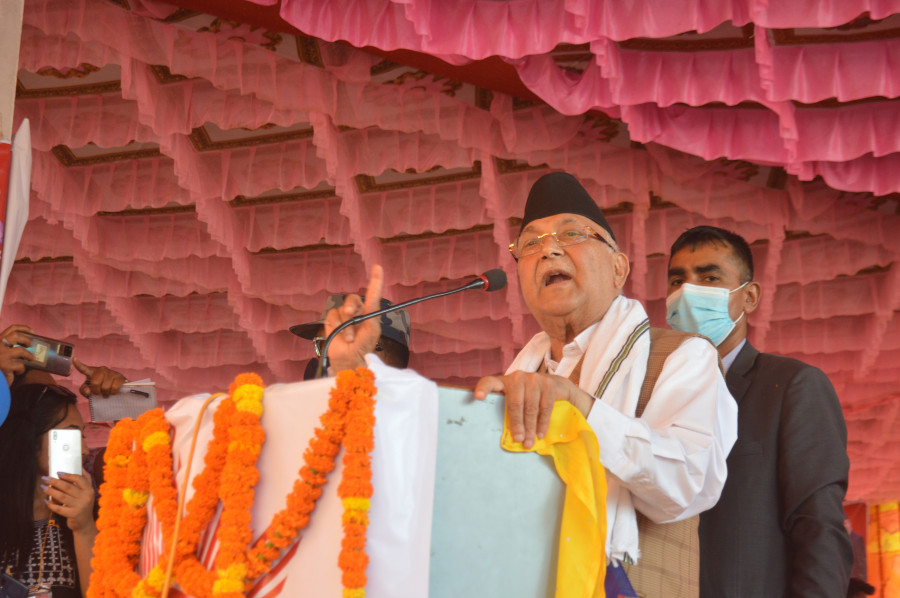Politics
In desperate bid, UML collaborates with two fringe parties on polls
As the five parties take forward their electoral alliance plan, the opposition party makes boastful claims even while pursuing any potential tie-up.
Binod Ghimire
With local level elections less that four weeks away, parties have already started flexing their muscles. As the five-party alliance of the ruling coalition has announced its modality for electoral alliances for the May 13 vote, the opposition CPN-UML has been making boastful claims—that it needs no other party’s support to win the elections—in public while seeking collaboration in private.
UML leaders, mainly its chairman KP Sharma Oli, say they are strong enough to fight against the five-party alliance, reasoning that only weaker forces need alliances to win.
Addressing a programme in Bhaktapur on March 30, Oli said his party was an iron cast weighing a quintal while other parties were pieces that weigh 1 kg each—totalling just 5 kilograms. “They [the five parties] need an alliance but we don’t. Our strength is incomparable to them,” he said.
Two weeks later, the largest party on Wednesday formed an electoral alliance with the Kamal Thapa-led Rastriya Prajatantra Party-Nepal and the Nepal Pariwar Dal. In the separate deals, the UML has agreed to have tie-ups with the two fringe parties wherever possible. Candidates from the two parties will contest the elections under the UML’s election symbol—sun. However, after winning the elections, they will remain the members of their original parties.
Thapa quit Rastriya Prajatantra Party in February, two months after Rajendra Lingden defeated him in a race for the party chairperson. Thapa then revived the RPP-Nepal.
The RPP-Nepal was merged into RPP in 2016 to form a united party. Since Thapa, along with some leaders, left the RPP, the new force doesn’t have strong structures in most of the local federal units. The Pariwar Dal is even smaller, with its base in just a few districts. The RPP won seven local units in the previous election while Pariwar Dal got just a couple of ward members victorious.
Observers see the UML’s decision to form the alliance as a desperate move.
Rajendra Maharjan, a political analyst, said after the five-party alliance, the UML was under pressure to form a poll alliance and only two fringe parties were available.
“Something is better than nothing. The UML must be expecting some increase in votes after the coalition,” he told the Post. “It is clearly a desperate move.”
The UML leadership had long been claiming that the five-party alliance will not remain intact. Last week, Oli claimed that the alliance would break very soon. Addressing a programme in Sipadol, Bhaktapur on April 6, Oli said that the ruling alliance had already developed deep fissures and it was only a matter of time before it fell apart.
Contrary to his prediction, the five ruling parties on Tuesday agreed on seven bases for fielding common candidates. They have broadly agreed to allocate the seats won by the respective parties last election to the same parties and share the seats won by the UML based on their strengths and other parameters.
The UML had won 294 local units in the 2017 elections, with 41 percent share in the mayor and deputy mayor and chairperson and vice-chairperson.
The UML’s deal on electoral alliance comes the very next day of the ruling parties developing the modality for seat-sharing. Analysts say by forging an alliance with the pro-Hindu party, the UML wants to appease Hindu voters.
Thapa’s party has given up the agenda of reinstating monarchy and is primarily focused on reviving Nepal as a Hindu state. Maharjan said Oli is in fear after Prime Minister Sher Bahadur Deuba went to Varanasi during his India visit and visited the temples there. Deuba, accompanied by his wife and four ministers, worshipped at Kashi Vishwanath Temple on April 3 where Yogi Adityanath, the Uttar Pradesh chief minister and a staunch Hindu nationalist leader of the Bharatiya Janata Party, accompanied the prime minister as he toured the state neighbouring Nepal.
“Oli has been prioritising Hindu agenda for a long time. He fears it could be hijacked,” said Maharjan. “The coalition with RPP-Nepal at the local level could be a trial for the general election.”
The UML leaders, however, say it is not a nationwide alliance. They claim that the RPP-Nepal and Pariwar Dal were ready for collaboration and the UML too gave its nod.
“How can we reject the support from any party during elections? Both the parties don’t have high expectations of seat-sharing,” Yubraj Gyawali, a UML vice-chairperson, told the Post. “The fact that the candidates from the party will contest with our election symbol suggests it is not a coalition as such.”
The candidates contesting the election with the symbol of a political party will be considered as belonging to the same party irrespective of their original party, according to the Election Commission. The commission had invited two or more willing parties to take the same symbol for election but no party came forward.
“Now if a candidate from one party wins the election with the vote symbol of another party, s/he would be considered to have won for the same party that owns the election symbol,” Yagya Bhattarai, a joint-secretary who oversees the law department at the commission, told the Post.
“If candidates from any party contest with the election symbol of the UML, they will be considered to have won for the UML.”




 22.12°C Kathmandu
22.12°C Kathmandu















